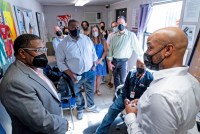Latest KFF Health News Stories
A Decades-Long Drop in Teen Births Is Slowing, and Advocates Worry a Reversal Is Coming
After three decades of declines in teen pregnancies, data shows the rates are starting to plateau. The reversal of “Roe v. Wade,” coupled with efforts to suspend sex education in schools and higher rates of youth mental health issues post-pandemic, could culminate in a perfect storm.
Con cambios en Medicaid, residentes de zonas rurales se sienten abandonados a su suerte
En las zonas rurales, la falta de acceso a navegadores, las personas que ayudan a los beneficiarios de Medicaid a mantener su cobertura o encontrar otro seguro si ya no reúnen los requisitos, podría agravar estas dificultades.
How Will Rural Americans Fare During Medicaid Unwinding? Experts Fear They’re on Their Own
As states review their Medicaid rolls after the expiration of a pandemic-era prohibition against kicking recipients off the government insurance program, experts say the lack of help available to rural Americans in navigating insurance options puts them at greater risk of losing health coverage than people in metropolitan areas.
‘Conscience’ Bills Let Medical Providers Opt Out of Providing a Wide Range of Care
Opponents of the wave of state legislation say the measures place health providers’ preferences over patients’ rights.
Meet the People Deciding How to Spend $50 Billion in Opioid Settlement Cash
As settlement dollars land at the state level, state councils wield significant power in determining how the windfall gets spent. And, though they will likely include the most knowledgeable voices on addiction, these panels also face concerns about conflicts of interest and other issues.
New Charleston Museum Nods to Historical Roots of US Health Disparities
The $120 million International African American Museum that opened this week in Charleston, South Carolina, allows visitors to step back in history at Gadsden’s Wharf, where tens of thousands of enslaved Africans arrived in America, the genesis of generations of health disparities.
Burnout Threatens Primary Care Workforce and Doctors’ Mental Health
Burnout is a widespread problem in the health care industry. Although the pandemic made things worse, burnout among doctors is a long-standing concern that health systems have become more focused on as they try to stop doctors from quitting or retiring early.
Will a ‘National Patient Safety Board,’ Modeled After the NTSB, Actually Fly?
A push is underway to create a National Patient Safety Board modeled after the National Transportation Safety Board, an independent federal agency that investigates plane crashes and other transportation disasters. But unlike the NTSB, some patient safety advocates say, the current proposal is toothless and wouldn’t provide transparency about the nation’s hospitals.
Many People Living in the ‘Diabetes Belt’ Are Plagued With Medical Debt
The “Diabetes Belt,” as defined by the Centers for Disease Control and Prevention, comprises 644 mostly Southern counties where diabetes rates are high. Of those counties, KFF Health News and NPR found, more than half also have high levels of medical debt.
What the Health? From KFF Health News: When an Anti-Vaccine Activist Runs for President
Robert F. Kennedy Jr.’s official entry into the presidential race poses a thorny challenge for journalists: how to cover a candidate who’s opposed to vaccines without amplifying misinformation. And South Carolina becomes the latest state in the South to ban abortion after roughly six weeks of pregnancy. Alice Miranda Ollstein of Politico, Rachel Cohrs of Stat, and Sarah Karlin-Smith of the Pink Sheet join KFF Health News chief Washington correspondent Julie Rovner to discuss these issues and more. Also this week, Rovner interviews KFF Health News senior correspondent Aneri Pattani about her project to track the billions of dollars coming from opioid makers to settle lawsuits.
A Striking Gap Between Deaths of Black and White Babies Plagues the South
Infant mortality rates across the South are by far the worst in the U.S. A look at South Carolina — where multimillion-dollar programs aimed at improving rates over the past 10 years have failed to move the needle — drives home the challenge of finding solutions, especially in rural communities.
What the Health? From KFF Health News: The Abortion Pill Goes Back to Court
A three-judge appeals court panel heard testimony this week about revoking the FDA’s 22-year-old approval of a key pill used in medication abortion and miscarriage management. The judges all have track records of siding with abortion foes. Meanwhile, as the standoff over raising the federal debt ceiling continues in Washington, a major sticking point is whether to impose work requirements on recipients of Medicaid coverage. Victoria Knight of Axios, Rachel Roubein of The Washington Post, and Sandhya Raman of CQ Roll Call join KFF Health News chief Washington correspondent Julie Rovner to discuss these issues and more.
Lawyer Fees Draw Scrutiny as Camp Lejeune Claims Stack Up
The Camp Lejeune Justice Act, which became law last year, created a pathway for veterans and their families to pursue damage claims against the government for toxic exposure at the military base. Now, advocates and lawmakers worry high lawyer fees could shortchange those injured.
How a 2019 Florida Law Catalyzed a Hospital-Building Boom
In Wesley Chapel, Fla., near Tampa, residents will soon have three general hospitals within a five-minute drive. The new construction is part of a hospital-building boom across Florida unleashed almost four years ago, when the state dropped a requirement that companies obtain government approval to open new hospitals.
¿Se podrá cumplir con la meta de terminar con la epidemia de VIH para 2030?
Debido a las interrupciones de la pandemia, los funcionarios federales no han tenido estimaciones sólidas de nuevas infecciones o el número de personas que viven con VIH desde finales de 2019.
US Officials Want to End the HIV Epidemic by 2030. Many Stakeholders Think They Won’t.
The federal government’s ambitious plan to end the HIV epidemic, launched in 2019, has generated new ways to reach at-risk populations in targeted communities across the South. But health officials, advocates, and people living with HIV worry significant headwinds will keep the program from reaching its goals.
For Uninsured People With Cancer, Securing Care Can Be Like Spinning a Roulette Wheel
When uninsured people are diagnosed with cancer, accessing resources and paying for treatment can be daunting. The safety nets meant to help often fall short, say cancer physicians and health policy experts who study access to care. Some patients find it easier to play the odds.
States Try to Obscure Execution Details as Drugmakers Hinder Lethal Injection
Pharmaceutical companies have put the brakes on many states’ ability to execute prisoners using lethal injections. Lacking alternatives, states are trying to keep the public from learning details about how they carry out executions.
Banning Noncompete Contracts for Medical Staff Riles Hospitals
It’s about the money — on both sides — as arguments swirl about patient safety, rising prices, and paying back on-the-job training.
Temp Nurses Cost Hospitals Big During Pandemic. Lawmakers Are Now Mulling Limits.
Missouri is considering making it a felony to jack up temporary health care staffing prices during a statewide or national emergency. It’s one of at least 14 states looking to reel in travel nurse costs, after many hospitals struggled to pay for needed staffers earlier in the covid pandemic.























